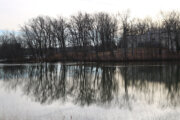The Caps and Wizards are staying put in D.C.’s Chinatown and Gallery Place, but a task force that delved into reimagining the neighborhood without them has released a plan to revitalize the once thriving and diverse neighborhood in the heart of D.C.
The Gallery-Place Chinatown Task Force pitched “8 Big Ideas” at the MLK Jr. Library to an audience of residents and Mayor Muriel Bowser on Saturday morning.
One part of the plans include developing a new Gallery Walk on 8th Street with a split road and pedestrian walkway in the center, making a more pleasing avenue from the convention center to the National Mall.
The plans also call for a revitalization of the Capital One Arena, but more importantly, the area outside of the arena.
D.C. Deputy Mayor for planning and Economic Development Nina Albert says making F and other surrounding streets more fan-friendly is a top priority.
Related news:
- Longtime Asian American residents raise concerns about DC’s ‘dwindling’ Chinatown
- How DC is planning for the future of Chinatown
- Chinatown is 1 of 3 inaugural ‘drug-free zones’ in DC. What does that mean?
“When there are events, perhaps there’s a way to bring what’s going on inside the arena — the game, the show — out, so that the public can also experience it and see it,” Albert said.
Representatives from Monumental Sports described the atmosphere as similar to what other venues from around the country have accomplished, particularly the Golden 1 Center in Sacramento, California, home of the Kings.
Green space is also a top priority with new gardens and lawns in Judiciary Square and “Botanical Streets.”
“What if our street system here were to be a way to capture a lot of the water and also an opportunity to provide shade and protection from the heat?” Albert said. “And we have an incredible zone and opportunity of native plants and trees that could line this entire grid of streets around this neighborhood.”
While many of the ideas pitched to the crowd were received positively, many voiced frustrations with immediate concerns.
“Drugs are being sold, crime is being committed … I cross this place every night, every morning, every evening, and there’s nothing being done there,” one resident said.
Many pointed to scooters zipping down sidewalks and posing a danger to pedestrians, people living on the street not being given basic necessities, as well as a lack of affordable housing for many who want to stay in Chinatown, as more immediate concerns.
The task force did address housing but their plans looked to be more long-term. They hope to add around 7,000 housing units over the years with three sites in mind: the current FBI building, the Department of Labor building and the Government Accountability Office site.
“This is a very big transformation of the neighborhood over time, these are not going to be short wins, these are going to be long term opportunities,” said Uwe Brandes, a scholar-practitioner in urban design and sustainable urban development at Georgetown University.
“We have no food store to walk to, we need basic amenities to bring if you’re going to bring in these people,” another resident said.
Albert later told reporters that talks are ongoing for a more traditional Asian grocery store to come to the area.
“We’re in conversations with different types of businesses and entrepreneurs who are trying to figure out how to deliver that,” she said, emphasizing that nothing is concrete yet.
After the presentation, visitors were welcomed to pitch their ideas to officials and write down fresh ideas.
Albert told WTOP that many of the projects could take years if approved, but some things, like more frequent festivals and a night market in Chinatown, could be pulled off within the next fiscal year.
Get breaking news and daily headlines delivered to your email inbox by signing up here.
© 2024 WTOP. All Rights Reserved. This website is not intended for users located within the European Economic Area.








